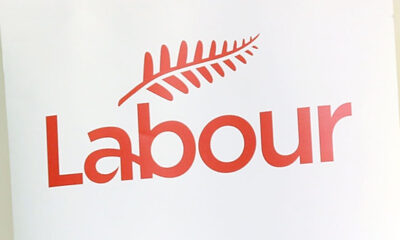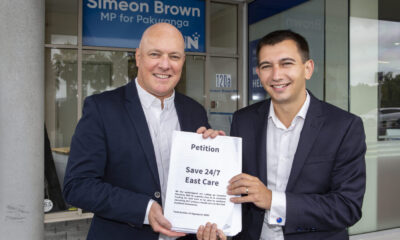Health
Labour Proposes Capital Gains Tax to Fund Free Doctor Visits

New Zealand’s Labour Party has introduced a plan for a targeted capital gains tax aimed at funding three free doctor visits per year for residents. This initiative, announced by party leader Chris Hipkins, seeks to provide a Medicard to all New Zealanders, which would be issued at birth or upon receiving residency or citizenship. The proposal emphasizes a commitment to enhancing healthcare access while ensuring that the tax burden remains minimal for most citizens.
Under the proposed tax framework, the capital gains tax would apply exclusively to the sale of commercial and residential properties. Notably, this plan would exempt the family home, KiwiSaver accounts, shares, business assets, inheritances, and personal items. Hipkins highlighted that nearly 90% of New Zealanders would not be subject to this tax on their property holdings, reinforcing the initiative’s focus on equity and accessibility.
The introduction of the Medicard aims to alleviate financial pressures on families and individuals seeking medical care. According to the Labour Party, the initiative is part of a broader strategy to strengthen the health sector and ensure that New Zealanders can access essential services without the burden of cost.
Details of the Capital Gains Tax Proposal
The capital gains tax is projected to generate significant revenue for the government, which will be reinvested into healthcare services. The initiative responds to growing concerns about access to medical care in New Zealand, where many citizens face barriers due to high costs. By providing three free visits annually, the Labour Party aims to create a more sustainable healthcare model that prioritizes preventive care.
The proposal is strategically designed to minimize the impact on the average citizen while targeting wealthier property owners. Hipkins emphasized that the tax would not affect the majority, stating, “Nine out of ten New Zealanders won’t pay tax on the property they own.” This assertion is intended to reassure citizens that the plan is equitable and focused on those who can afford to contribute more to the public good.
Furthermore, the Medicard initiative aligns with Labour’s broader goals of enhancing social welfare and promoting health equity. By providing free access to general practitioners, the government hopes to reduce long-term healthcare costs associated with untreated conditions.
Public Response and Future Implications
The public’s reaction to the proposed capital gains tax and the Medicard initiative has been mixed. Supporters argue that the plan could significantly improve healthcare outcomes and promote a healthier population. Critics, however, express concerns about the potential impacts on the real estate market and whether the tax could deter investment in property.
As the Labour Party moves forward with this proposal, it will likely engage in discussions with stakeholders across various sectors to refine the plan. The government aims to present a balanced approach that addresses the healthcare needs of New Zealanders while ensuring economic stability.
In summary, the Labour Party’s targeted capital gains tax proposal signifies a bold step towards enhancing healthcare access in New Zealand. By focusing on equitable taxation and free medical visits, the government is positioning itself as a leader in public health reform, with the potential to make a lasting impact on the wellbeing of its citizens.
-

 Sports2 months ago
Sports2 months agoNetball New Zealand Stands Down Dame Noeline Taurua for Series
-

 Entertainment2 months ago
Entertainment2 months agoTributes Pour In for Lachlan Rofe, Reality Star, Dead at 47
-

 Entertainment2 weeks ago
Entertainment2 weeks agoNew ‘Maverick’ Chaser Joins Beat the Chasers Season Finale
-

 Sports2 months ago
Sports2 months agoSilver Ferns Legend Laura Langman Criticizes Team’s Attitude
-

 Politics3 weeks ago
Politics3 weeks agoNetball NZ Calls for Respect Amid Dame Taurua’s Standoff
-

 Entertainment2 months ago
Entertainment2 months agoKhloe Kardashian Embraces Innovative Stem Cell Therapy in Mexico
-

 World3 months ago
World3 months agoPolice Arrest Multiple Individuals During Funeral for Zain Taikato-Fox
-

 Sports2 months ago
Sports2 months agoGaël Monfils Set to Defend ASB Classic Title in January 2026
-

 Entertainment4 weeks ago
Entertainment4 weeks agoTyson Fury’s Daughter Venezuela Gets Engaged at Birthday Bash
-

 Sports4 weeks ago
Sports4 weeks agoHeather McMahan Steps Down as Ryder Cup Host After Controversy
-

 Entertainment4 weeks ago
Entertainment4 weeks agoTyson Fury’s Daughter Venezuela Gets Engaged at Birthday Bash
-

 World4 weeks ago
World4 weeks agoNew Zealand Firefighters Plan Strike on October 17 Over Pay Disputes





















